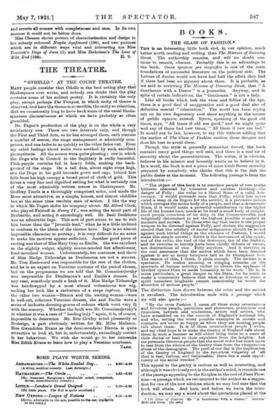THE THEATRE.
" OTHELLO " AT THE COURT THEATRE.
MANY people consider that Othello is the best acting play that Shakespeare ever wrote, and nobody can doubt that the play
contains some of his noblest poetry. It is certainly the only play, except perhaps The Tempest, in which unity of theme is observed, and here the theme is so terrible, the unity so relentless, that we occasionally long to have back some of the usual Shake- spearean discursiveness at which we have probably so often grumbled.
Mr. Fagan's production of the play is on the whole a very satisfactory one. There are two intervals only, and though the First and Third Aots, as he has arranged them, each contain a number of scenes, the stage management is admirably com- petent, and one fades in as quickly as the other fades out. Even my rabid feelings about waits were soothed by such excellent promptitude. All the scenes were quite pleasing ; one in which the Doge sits in Council in the Sagittary is really beautiful.
Pink-purple curtains fall in heavy folds, making the back- ground of the stage. On a tall dais, about eight steps high, site the Doge in his gold brocade gown and cap; behind him
falls from his.high canopy a broad panel of cloth of gold. This forms a very fine and dignified setting for what is certainly one of the most admirably, written scenes in Shakespeare. Mr.
Godfrey Tearle is a thoroughly competent actor, and made the Moor most attractive, as a simple, honest, and almost childlike but at the same time resolute man of action. I like the way
in which Mr. Fagan shifts his company about. Mr. Alfred Clark, who played Falstaff in Henry IV., was acting the small part of
Brabantio, and acting it exceedingly well. Mr. Basil Rathbone was an admirable lago. This sort of part seems to me to suit him better than the " juvenile lead," when he is a little inclined to conform to the ideals of the cinema hero. lago is an almost impossible character to portray ; it is very difficult for an actor to make his motives appear sufficient. Another good piece of casting was that of Miss Mary Grey as Emilia. She was excellent as the slightly vulgar, slightly coarse-minded but affectionate, loud-mouthed woman. Unfortunately, her costumes and those
of Miss Madge Titheradge as Deedemona are not a success.
Mr. Tom Heslewood was responsible for the rest of the clothes, and he is an expert on Venetian costume of the period chosen, but on the programme we are told that Mr. Commisarjevaky was responsible for Desdemona's and Emilia's dresses. In any case, somebody made a hash of it. Miss Madge Titheradge was handicapped by a most absurd voluminous tow wig,
making her look like a caricature of a stage ingenue. While the other two women—Bianca and the waiting-woman—were
in well-cut, coherent Venetian dresses, she and Emilia wore a series of inchoate dressing-gowns of colours which went very ill with the scenery. Whether the fault was Mr. Commisarjevsky's
or whether it was a case of " leading lady " again, it is, of course, impossible to determine. Mr. Eric Cowley acted pleasantly as Roderigo, a part obviously written for Mr. Miles Malleson.
Miss Gwendolen Evans as the demi-mondaine Bianca is quite attractive to look at, but is, unfortunately, exceedingly correct in her behaviour. We wish she would go to her namesake Miss Edith Evans to learn how to play a Venetian courtesan.
TAAL


































 Previous page
Previous page